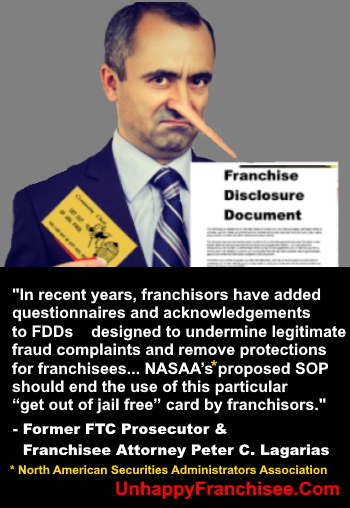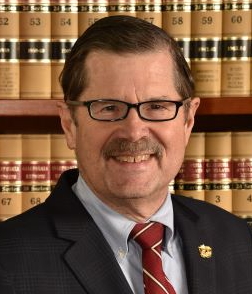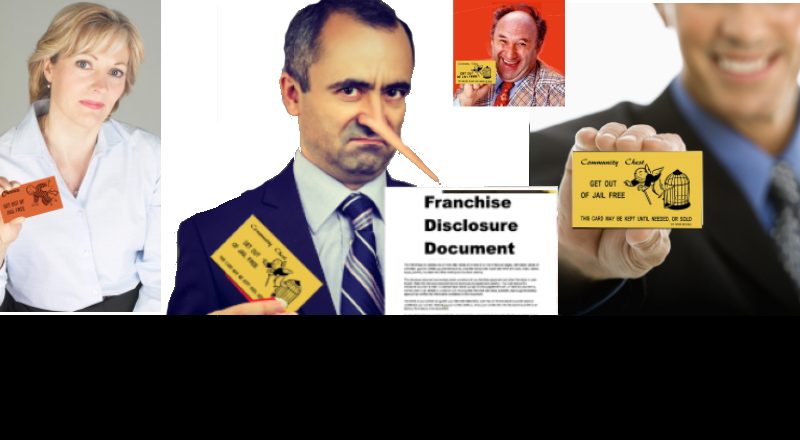Peter Lagarias: Let’s Revoke Franchising’s Newest “Get-Out-of-Jail-Free” Card!
Both franchisees and law-abiding franchisors should voice support by January 5, 2022 for NASAA’s proposed SOP to restore anti-fraud protections in franchise disclosure documents (FDDs)
By: Peter C. Lagarias, Esq.
 The purpose of the franchise disclosure laws is to ensure that franchise sellers provide important information about the franchise business in a written disclosure document and that the information provided is truthful and complete.
The purpose of the franchise disclosure laws is to ensure that franchise sellers provide important information about the franchise business in a written disclosure document and that the information provided is truthful and complete.
Franchise disclosure laws were not enacted to enable franchisors to disclaim liability for violations of their legal obligations including to be truthful in selling franchises.
However, in recent years, a growing number of franchisors have added questionnaires and acknowledgements to Franchise Disclosure Documents (“FDDs”) designed to undermine legitimate fraud complaints and remove protections for franchisees. These additions are unnecessary for legitimate franchise sellers who comply with franchise disclosure laws, but they provide a “Get-Out-of-Jail-Free-Card” for those who would defraud franchise investors with illegal earnings claims and other misrepresentations if allowed to do so with impunity.
The good news is that The North American Securities Administrators Association (“NASAA”) has issued a proposed statement of policy (“SOP”) for public comment regarding franchisors’ use of these questionnaires and similar additions. If adopted, the SOP would significantly regulate franchisors’ use of fine print techniques to disclaim and bar their liability under the state franchise disclosure laws.
I strongly encourage all those who oppose fraudulent franchise practices by bad actors to make their voices heard. Public comments in support of the proposed SOP (which is linked below) are due by January 5, 2022.
The three email addresses to send public comments are set forth on the front page of the proposed SOP.
The proposed SOP recognizes and regulates the proliferation of acknowledgements, questionnaires, and related provisions which franchisors use to negate franchisees’ fraud claims.
Namely, as part of the purchase process, franchisors require prospective franchisees to state that they did not receive or rely on earnings claims or other misrepresentations outside the FDD, often in long, boilerplate acknowledgements or questionnaires. When franchisees later sue alleging that they received illegal additional earnings claims or misrepresentations, franchisors use these acknowledgements and questionnaires to get courts to dismiss their lawsuits without hearing the franchisees’ evidence of fraud. This sometimes happens even though the applicable franchise disclosure laws make such additional earnings claims or misrepresentations illegal and contain anti-waiver provisions.
When franchisors supply additional financial performance information outside of the FDD (in emails, news articles, oral sales pitches, pro formas or by other means) they are violating the franchise disclosure laws and the FTC Act. While the Federal Trade Commission (FTC) has not not reacted to this misconduct, NASAA’s proposed SOP should end the use of this particular “get out of jail free” card by franchisors.
The SOP also addresses the ongoing and accelerating proliferation of mischief caused by disclaimers, acknowledgements and questionnaires added to FDDs. Franchisors often ask franchisees to state that they read and understood everything in the FDD, that the franchise business involves risk, and that success will only be achieved through the franchisee’s own hard work and skill. Again, the purpose of these types of boilerplate acknowledgements is defensive use in court to disclaim any and all liability.
Many franchisors claim that their concepts do not require prior knowledge or experience in their industry or in business. Indeed, many franchise sellers specifically seek out inexperienced operators who will trust their representations and rely on their guidance. Franchisors should not be able to make these “no experience necessary” sales pitches but then disclaim this in acknowledgements and questionnaires.
Franchise agreements are already one-sided, weighting the contractual balance of power in favor of the more-sophisticated and powerful franchisors. They certainly should not also be able to insulate franchisors from the consequences of violating the law, such as illegal and false earnings claims made outside the FDD, or misrepresenting a failed business model as a proven success through false, deceptive and expertly delivered lies.
The Proposed SOP takes a major step in this direction and warrants the support of both franchisees and law-abiding franchisors.
Read: NASAA’s Request for Public Comment 12/6/21 (PDF)
 Peter C. Lagarias, Esq., is the founding partner of Lagarias, Napell & Dillion, LLP, a San Rafael, California law firm.
Peter C. Lagarias, Esq., is the founding partner of Lagarias, Napell & Dillion, LLP, a San Rafael, California law firm.
The firm specializes in representing franchisees and their associations, and he is a certified specialist in franchise and distribution law by the Office of Legal Specialization of the State Bar of California.
Peter Lagarias started his distinguished career in franchise law as a prosecutor for the Federal Trade Commission.
Also read:
Franchise Discussion, Documents, Links: NASAA Proposed S.O.P.
ZOMBIE FRANCHISEES: Can We Save Them? by Peter Lagarias
Attorney Peter Lagarias: Over-Regulation of Franchising is a Myth
MARK GOLOB LAWSUIT: Overview, Updates, and Discussion
WHAT DO YOU THINK? SHARE A COMMENT BELOW OR EMAIL US AT UNHAPPYFRANCHISEE[at]GMAIL[dot]COM
TAGS: Peter Lagarias, Lagarias, Napell & Dillion, LLP, NASAA, North American Securities Administrators Association, Federal Trade Commission, FTC, Franchise Legislation, Franchise Disclosure Document, FDD, NASAA SOP


Thanks for the information and invite, Sean!
North American Securities Administrators Association, Inc. (NASAA)
Ms. Andrea Seidt – Ohio Securities Commissioner – Ohio Department of Commerce
Dale Cantone – Chair. Office of the Attorney General. Division of Securities
Thank you for the opportunity to express this public opinion.
As you’re aware, franchise agreements are “adhesion” agreements by their very nature. Typically and considerably one-sided on behalf of the franchisor for the express purpose of maintaining the “strength” of their respective systems and marks. These agreements are replete with protections for the franchisor consisting of default provisions, termination provisions, integration clauses, non-disclosure provisions, binding arbitration in their chosen jurisdictions, post-term covenants, and the inability of Franchisees to sue or bring class-action suits against them.
Moreover, many of these provisions and protections are all too often used against the Franchisee to place egregious pressure and force should the Franchisee “get out of line” with the franchisor. Threats by franchisors are routine in franchising and used to bring Franchisee’s “inline”. It becomes their ultimate “hammer” if you will.
With all of the aforementioned protective provisions on the franchisor’s behalf, notwithstanding the many more than I’ve not mentioned, the “questionnaires” that are made part of contract exhibits to be executed only serve to add even more onerous and wholly unnecessary protections on the behalf of the franchisor. Some franchisors go far beyond what might be standard in these questionnaires with the addition of ridiculously outrageous added terms that do not belong. See example – Exhibit H to the Franchise Disclosure Document.
Due to highly publicized misinformation concerning franchises by way of endorsements, columns, publications, franchise grading, vetting, profit and loss information, and reviews, potential Franchisees are fed a seemingly endless stream of “positive press” that often flies in the face of information provided in the Franchise Disclosure Document. By the time a prospective Franchisee is prepared to execute agreements with a franchisor they are fully invested with time, effort, energy, research, and all the misinformation they will have come across.
Unfortunately, in many instances, they are making their final decisions with their hearts and not their heads. They will often not understand the ramifications and “releases” they’re providing when, in the final hours, asked to sign the questionnaire that adds another layer of the Franchisor covering themselves even though they may have been provided with several “double winks” along the way to signing agreements. Imagine the pressure one might feel when again, in the final hours, they could be told if you do not sign this, we may not sell you the franchise.
While it is true that these over-the-top questionnaires are part of the FDD it is rare to have a Franchisee that fully understands these 200+ page disclosures and attachments when even if reviewed by a competent franchisee attorney they’ll be no negotiating nor carving out on the questionnaires. Again, the franchisor has been provided this document by franchise-centric attorneys who simply add them, with some modification, to the contract template they will often use.
In summary, I fully endorse the elimination of these egregious and arbitrary questionnaires knowing that on their face they are nothing more than anti-Franchisee tools to utilize in the event of a problem going forward that might even be supported by truth and evidence on behalf of the prospective Franchisee. It is but another example of the inequity in franchising by ethically absent franchisors.
Once again, I wish to thank you for the opportunity to express my opinion, and frankly, the opinion of many others who desire fairness, franchise equity, and standards that serve to preserve and equalize the rights of Franchisees.
Sincerely and respectfully,
Kim G. Perrotta
My comment on January 5th, 2022 to the North American Securities Administrators Association, Inc. (NASAA)
High-quality franchise organizations do not need any “sleight of hand” to have others say things that they cannot/will not state publicly themselves. This leaves franchise companies, that are not top-tier, to feel like they must use franchisee survey results and clever PR campaigns masquerading as news stories to make claims that the franchisors themselves are not legally or willing to say (such as a financial performance representation).
All this, in order to sell more and more franchises to unsuspecting franchisee candidates. If certain activities are prohibited for franchisors to do/say themselves (not included in the FDD), why should it be acceptable for them to hire others to do/say the same?
Furthermore, the franchise community should not give a pass that allows franchise companies to use advance Questionnaires and Acknowledgments to skirt the rules!
Sincerely,
Jeff Johnson
Founder and CEO
Franchise Research Institute